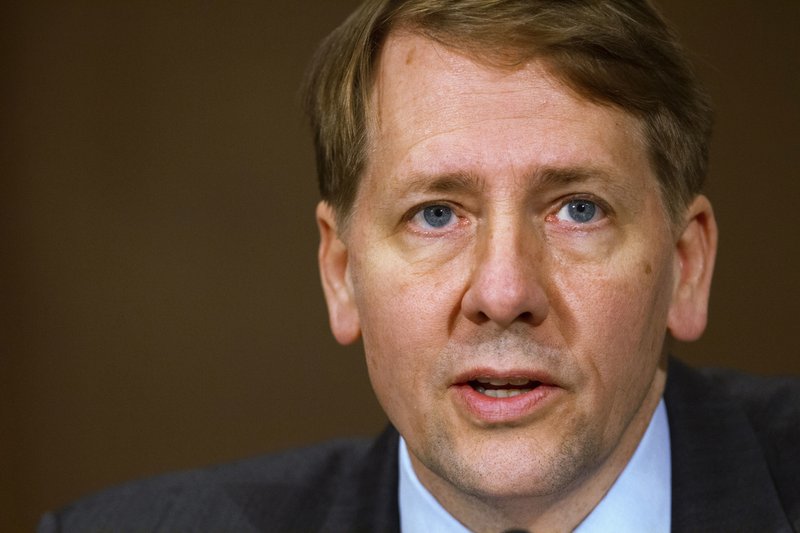NEW YORK -- Payday and auto title lenders will have to adhere to stricter rules that could significantly curtail their business under rules finalized Thursday by a federal regulator. But the first nationwide regulation of the industry is still likely face resistance from Congress.
The Consumer Financial Protection Bureau's rules largely reflect what the agency proposed last year for an industry in which the annual interest rate on a payday loan can be 300 percent or more. The cornerstone is that lenders must determine before giving a loan whether a borrower can afford to repay it in full with interest within 30 days.
A key goal is to prove that borrowers, who are often in dire situations, are able to pay without having to renew the loan repeatedly. The rules would set limits on the number of times a borrower could renew the loan.
Because studies by the Consumer Financial Protection Bureau have found that about 60 percent of all loans are renewed at least once and that 22 percent of all loans are renewed at least seven times, this cap is likely to severely handicap the industry's business model. In California, the largest payday loan market, repeat borrowers made up 83 percent of the industry's loan volume.
The protection bureau estimated that loan volume in the payday lending industry could fall by 66 percent under the new rules. The industry, which operates more than 16,000 stores in 35 states, will likely see thousands of payday-lending store closures nationwide. Regulation of the sector has been largely left to the states, 15 of which effectively ban payday lending or auto title lending because of caps on interest rates.
"Too often, borrowers who need quick cash end up trapped in loans they can't afford. The rule's common-sense ability-to-repay protections prevent lenders from succeeding by setting up borrowers to fail," Consumer Financial Protection Bureau Director Richard Cordray said in a statement.
While the industry may garner little sympathy from the public, there is an economic need for small-dollar, short-term loans, and people who use payday loans now might turn to other high-cost ways of making ends meet, like using pawnshops. The payday lending industry has a significant lobbying presence in Washington, and Republicans tend to be hostile toward any regulations proposed by the protection bureau, which was created by the administration of President Barack Obama.
In addition to the "full payment test" and the limits on loan renewals, the Consumer Financial Protection Bureau rules would also restrict the number of times a payday lender can attempt to debit a borrower's account for the full amount without getting additional authorization.
Consumer advocates, who have long pushed for additional regulations on the industry, cheered the decision.
"Payday and car title lenders profit from repeatedly dragging hard-pressed people deeper and deeper into debt, and taking advantage of families when they are financially vulnerable," said Lisa Donner with Americans for Financial Reform. "Curbing the ability to push loans that borrowers clearly cannot repay is a key protection."
But there are bills pending in Congress to more severely restrict the types of regulations the Consumer Financial Protection Bureau can propose, and Republicans have called for President Donald Trump to fire Cordray. Another bill would roll back other consumer protections the agency has finalized, most notably the rules ending what is known as forced arbitration, by which banks and financial companies can force consumers into third-party arbitration instead of allowing consumers to file class-action lawsuits against them.
Before Thursday's announcement, the only federal regulation that applied to the payday lending industry was the Military Lending Act, which places interest-rate and debt-collecting restrictions on loans to members of the military. This would be the first time all consumers would be affected.
The Consumer Financial Protection Bureau's rules imply that the bureau clearly wants banks and credit unions to take over the small-dollar lending industry. Financial companies are exempt from the rules if they make less than 2,500 loans a year and earn less than 10 percent of their revenue from these types of loans, which fits into the banks' and credit unions' business model. The Credit Union National Association, the trade group for the credit union industry, said they are "closely analyzing" the new rules.
At the same time as the protection bureau released its new rules, another federal regulator, the Office of the Comptroller of the Currency, announced that it was rolling back some restrictions it had placed on loans known as deposit advance products, which are similar to payday lending. This could allow banks to step into the payday lending space.
The new rules will take effect 21 months from when they are published in the Federal Register, which usually happens within a week of an announcement.
Business on 10/06/2017

